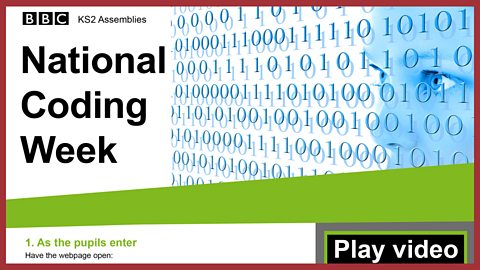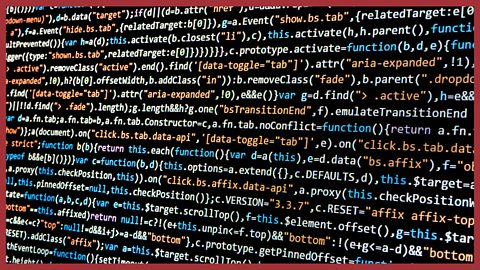In short...
Themes: Communication; working together; checking work; learn from mistakes.
Summary: is a volunteer-led event for schools, libraries, clubs, businesses and anyone else interested in computers, robots and programming. Its aim is to 'help build people's confidence and skills by encouraging volunteers to run fun and engaging digital events'. The first National Coding Week was held in 2014. In 2024 National Coding Week starts on Monday 16 September.
Resources: the and an .

The video
National Coding Week
Minna Kane visits Marish Primary School for 91»»±¨ Teach to find out how pupils there use coding to guide a robot car through a maze of town streets. The children can only use three instructions: 'Forward', 'turn 90 degrees right' and 'turn 90 degrees left'.
It's a tricky assignment, but when things go wrong the pupils don't give up. They work together, learning from their mistakes, until they finally manage to get the car through the town to where it needs to be.
As the video says: 'You have to find and fix mistakes until your code does exactly what you want.'
Duration: 5' 15"
End of speech: 'And getting rid of the bugs is all part of the fun.'
Video questions
- What are the three coding instructions the children can use? (FD, Rt 90 and Lt 90)
- What are mistakes in computer code called? (Bugs)
- Can you name three places marked on the pupils' town map? (Answers might include any of: hairdresser, florist, gym, baker, sports shop)
- What is the word for a list of coding instructions, like the one that the car follows? (A 'procedure')
- What name do the pupils choose for their procedure? ('Drive')

Key links
Download / print the assembly framework ready for use

Click to display the image full-size


Suggested framework
1. Entry music
(also in Related links below). This piece of violin music is played by a human being…but was composed by Iamus, a computer! (Or you might choose songs from the Computing collection detailed below in Related links).
2. Introduction
Display the and ask: 'Does anyone know what this is?' Confirm that it's a piece of computer code, the instructions we give computers and robots to tell them what to do. Tell the assembly: 'We're going to find out more about coding today - what it is, how we can do it and how coding can help us with our lives.'
3. The video
Play the video. The duration is 5' 15" and the final words are: 'We call mistakes "bugs". And getting rid of the bugs is all part of the fun.'
4. After the video
You could ask a group of children to replicate the car's journey seen in the video. Invite pupils to stand at the front of the assembly hall to represent a maze of town locations. Each child should do an appropriate mime - eg kneading bread (the baker), snipping scissors (the hairdresser) or lifting weights (the gym). Blindfold another pupil and invite individual classmates to call out instructions - 'forward', 'right 90', 'left 90' - to guide the blindfolded pupil through the maze. To avoid accidents, encourage the blindfolded child to practise the slow, one-step-at-a-time movement shown in the video.
5. Time to talk
Ask: ‚ÄòWhat kinds of thing can we do with coding? Why is it important?‚Äô The pupils' responses might include computer games, as well as programs used to help us with our lives (eg online searches / school or hospital records / etc). You could suggest that, back in the classroom, pupils browse the 91»»±¨ videos and resources in the 'Related links' section below, to find out more about the possibilities of coding. Ask: ‚ÄòWhat does "debugging" mean? What do we do when we debug computer code?‚Äô Establish that debugging is tracking down and fixing mistakes in the code.
You could develop the point with: ‘So does this mean mistakes are a bad thing?’ and guide pupils to an understanding that, in coding as in life, mistakes can be a positive thing. They are opportunities for us to learn how to get things right. Ask: ‘What personal qualities do you need to be a good coder? What makes someone good at coding?’ Pupils might suggest that patience and persistence, attention to detail, the ability to work well with other people and a willingness to learn from our mistakes all go to make someone good at coding.
6. Opportunity to sing
If your assembly is to include a song this would be a good time for it. Suggestions from 91»»±¨ collections below.
7. Opportunity to reflect
Coding is all about communication, saying clearly what we want…
But it's also about listening to others, being patient, working hard and learning from our mistakes…
If we can do all that, we'll be good coders. But more importantly, we'll be good people too…
Think to yourself: are you good at all of those things? Could you find ways to improve?
8. Opportunity for prayer
Use your standard form of address ('Dear God' etc) and:
We thank you for our inventive minds that can make wonderful things such as robots.
Help us to learn how to communicate and say clearly what we want.
Help us to listen to others, to be patient, to work hard and to learn from our mistakes.
That way, we'll be good coders. But more importantly, we'll be good people too.
Amen.

Suggested songs
Song: 'While we live we learn' (All about our school, no 3. Vocal version)
While we live we learn, (while we live we learn,)
While we learn we grow, (while we learn we grow,)
And the more we grow, (and the more we grow,)
So the more we know, (so the more we know,)
And the more we know, (and the more we know,)
Then the readier we will be
For all life's big adventures
And all life's mysteries.
While we live we learn, (while we live we learn,)
While we learn we grow, (while we learn we grow,)
And the more we grow, (and the more we grow,)
So the more we know, (so the more we know,)
And the more we know, (and the more we know,)
Then the readier we will be
For all life's big adventures
And all life's mysteries.
For all life's big adventures
And all life's mysteries.
Song: 'You've got to move'. Come and Praise, no 107. Vocal version.
You’ve got to move when the Spirit says move,
You’ve got to move when the Spirit says move,
‘Cos when the Spirit says move,
You’ve got to move when the Spirit,
Move when the Spirit says move.You’ve got to sing when the Spirit says sing,
You’ve got to sing when the Spirit says sing,
‘Cos when the Spirit says sing,
You’ve got to sing when the Spirit,
Sing when the Spirit says sing.You’ve got to clap when the Spirit says clap,
You’ve got to clap when the Spirit says clap,
‘Cos when the Spirit says clap,
You’ve got to clap when the Spirit,
Clap when the Spirit says clap.You’ve got to shout when the Spirit says shout,
You’ve got to shout when the Spirit says shout,
‘Cos when the Spirit says shout,
You’ve got to shout when the Spirit,
Shout when the Spirit says shout.You’ve got to move when the Spirit says move,
You’ve got to move when the Spirit says move,
‘Cos when the Spirit says move,
You’ve got to move when the Spirit,
Move when the Spirit says move.
Song: 'Code-o-de-oh!' (from Songs: Computing / Science)
Code, code, code-o-de-oh!
Code, code, code-o-de-oh!
Code, code, code-o-de-oh!
Co-doh-de-o-doh, doh!
Games that we can create
Mazes to navigate
So, code, where shall we go?
Co-doh-de-o-doh, doh!
Code, code, code-o-de-oh! (etc)
Drag, drop, jump through a hoop
Move on, loop round a loop
So, code, where shall we go?
Co-doh-de-o-doh, doh!
Code, code, code-o-de-oh! (etc)
Shapes and letters that move
Ideas get in the groove
So, code, where shall we go?
Co-doh-de-o-doh, doh!
Code, code, code-o-de-oh! (etc)
Bugs and puzzles to fix
Perform magical tricks
So, code, where shall we go?
Co-doh-de-o-doh, doh!
Code, code, code-o-de-oh! (etc)

